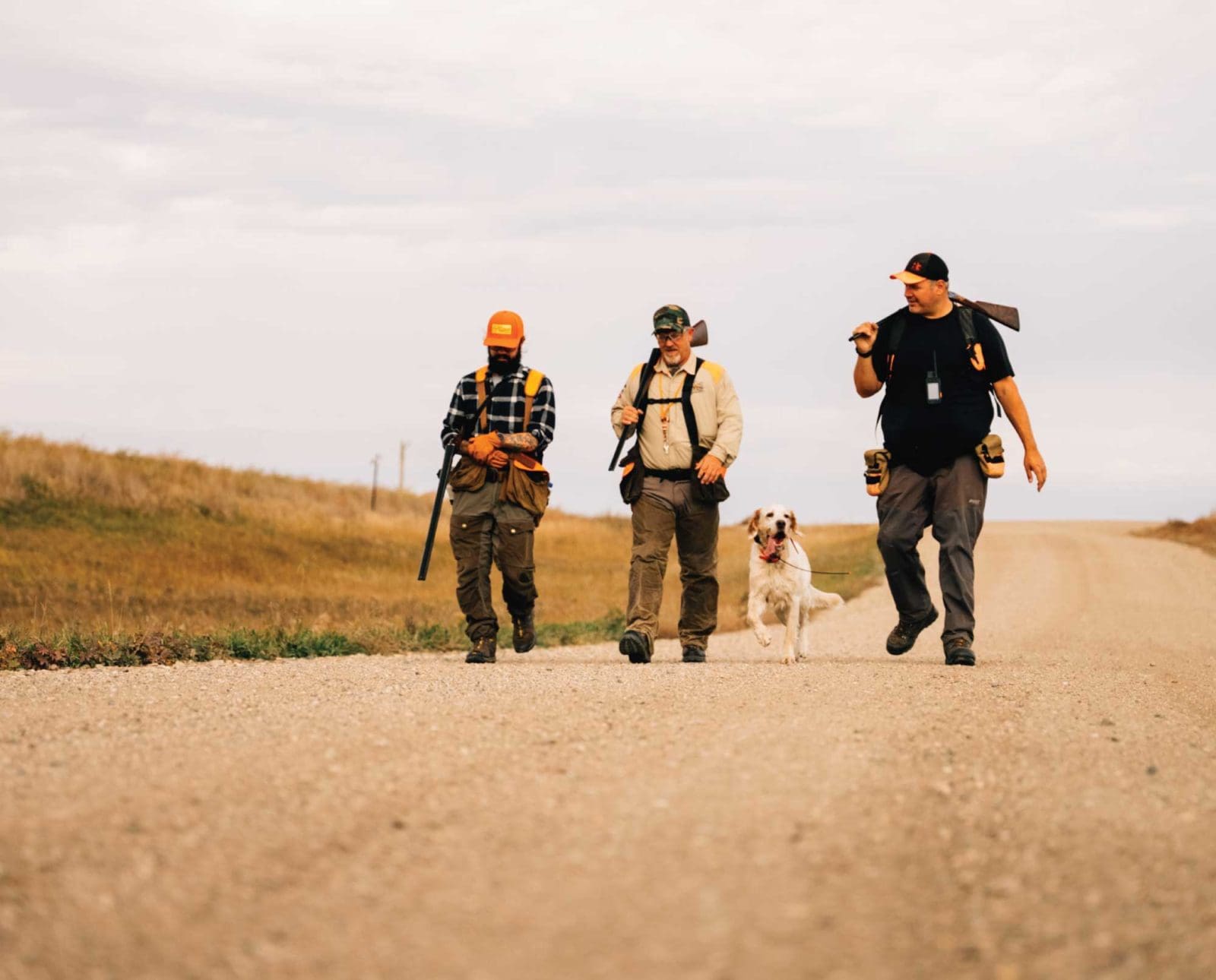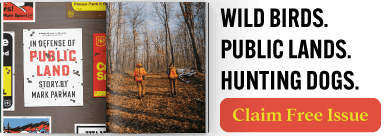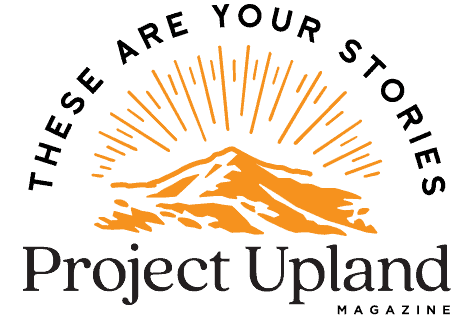
Jennifer Wapenski is the Director of Operations and Managing Partner…
How traveling hunters can have meaningful economic and cultural impacts in bird-hunting destination towns
“We’re just really grateful that you’re here. Truly, thanks for coming.”
The sincere words of appreciation caught me by surprise for two reasons. First, I was recognized as a visitor—I’m not used to small towns and just how much outsiders stand out—and second, my presence was genuinely welcomed.
Listen to more articles on Apple | Google | Spotify | Audible
We were at a craft beer festival in small-town Montana during the upland bird season. Having already completed our hunt for the day, we decided to check out the local brewery scene and support the event. As I looked around, I realized that the four of us stood out like sore thumbs with our out-of-state license plates and by not knowing any of the other attendees. But rather than a “you’re not from here, are ya?” glance, we were warmly welcomed at the event. Several people struck up a conversation with us and expressed their appreciation and surprise that we’d taken the time to stop by the festival and support the town.
I’ve seen the WELCOME HUNTERS signs strung up on bars and gas stations across the Great Plains, but I figured it was just seasonal, promotional décor that beer companies distributed. It never occurred to me that the sentiment might be sincere. Living in a crowded state that does not cater to out-of-state hunters, I assumed residents viewed all visiting hunters with a degree of suspicion and a hint of resentment.
Back at the motel that evening, we surveyed the parking lot full of bird-hunting rigs. Wisconsin, Missouri, Washington, Oregon, New York, Florida; it seemed like every region of the U.S. had descended upon this tiny Montana town to enjoy its wild birds and open spaces. That prompted a spirited discussion of small-town economics and what, if any, ethical obligations visiting hunters might consider.
How do bird hunters affect rural economies?
To better answer this question, I reached out to Laurie Shelton, the CEO of the Huron Chamber and Visitor’s Bureau in South Dakota. Huron hosts an annual Ringneck Festival, which attracts upland bird hunters from all over the United States. The 2022 Ringneck Festival hosted 21 teams for the competitive hunting event, only four of which were “local” hunters from within 150 miles or closer. More than 100 out-of-state hunters came to Huron to participate in the weekend event.
According to Shelton, 80 percent of Huron’s lodging revenue in October, November, and December comes from out-of-state hunters. She said that restaurants with breakfast service see a significant increase in revenue. In contrast, grocery stores only see a slight increase of about two to three percent in additional revenue during that time.
READ: South Dakota Pheasant Hunting – A Complete Guide to the Pheasant State
Numbers aside, I asked about the general feeling toward visiting hunters. Shelton said, “Our community loves to play host to our hunters and is genuinely interested in how their hunts went, along with giving suggestions of new places to hunt.”
Out-of-towners can find evidence of the community’s support in the hours dedicated to the festival, too, which is now in its 25th year. “The Ringneck Festival uses volunteers such as landowners, scorekeepers, and additional help for the hunt check and banquet…we estimate using about 110 volunteers each year to help make the event a success,” she said.
Across the region, other representatives from rural chambers of commerce echoed similar sentiments. The Sheridan County Chamber in Montana put me in contact with several motel operators who confirmed that out-of-area dollars during the upland bird season have an outsized impact on their annual revenue stream. In neighboring Daniels County, motel owners reported being sold out of available rooms more than a year in advance, with the vast majority of reservations coming from outside Montana. In short, the annual influx of hunters and their wallets is a significant piece of the economy in rural bird-towns across America.
Supporting the local economies of bird-hunting towns
As a DIY public land hunter, I tend to take my self-sufficiency on the road with me, too. I like to load up on groceries at home, pack the truck to capacity, and survive off of granola bars and beef jerky. After all, any minute spent eating in a restaurant or restocking supplies is a minute not spent in the field with my dogs in pursuit of birds and adventure.
I am not alone in that trend, either, seeing as South Dakota small-town lodging can jump as much as 80 percent during the bird season, but grocery stores only see a small blip in their balance sheets. Perhaps there’s a lesson to be learned in how we can give back to the communities who welcome us with open arms each fall.
Yes, we all need a place to stay and fuel for our vehicles while in town—and the local economies clearly see us coming. But what about the other businesses that these towns need to survive throughout the rest of the year? Can hunters have a significant influence in different categories besides lodging?
Before you load up at Costco with a week’s worth of supplies, consider what you can buy from the mom-and-pop grocer in rural South Dakota. If you’re camping, maybe spend a few extra dollars to stay at the municipal campground instead of claiming a free spot on public land. Throw some bills in the donation jar at the checkout line. Plan a dinner or two out on the town. It doesn’t have to become prohibitively expensive to hunt out-of-state, but perhaps it’s only fair to invest in the communities from which we take resources in the form of birds and other game.
Connecting with the local communities to ensure a welcoming future
I live in a large metropolitan area. Admittedly, I’m blind to many of the culture and considerations of small-town life. Our hunting partners, however, are far more in tune with the realities of rural living. Always on the lookout for local activities to support, they were the ones who discovered the Brew Fest and encouraged us all to attend after our day in the field.
While the bartender poured our beers, my friend asked him about the high school basketball team and their ongoing rivalry with the neighboring town. I just blinked. I’ve never followed any high school sports besides the ones I played, let alone those in a town 1,000 miles away from home. But the rapport was immediate and genuine. To my great surprise, I learned that our friends had attended Friday night games on past trips and even had team hats to show for it.
Later that week, when our friends took us to their favorite breakfast spot in town, I was caught off-guard when they started inquiring about the off-menu options. The waitress lit up and offered her personal recommendations for which items to get and which to avoid. I flipped my menu back and forth, attempting to follow along, but it was useless. They were speaking the local tongue, and I was not going to keep up on this first visit. I realized that my credibility had to be earned with time and effort.
As we left Montana in the rearview mirror and headed home, I thought about the resources that came together to offer us an unforgettable week of hunting: landowners who make their property available for public access programs, generous federal and state public land resources, regional biologists who work tirelessly to manage wild bird populations, and local communities who offer services and supplies to visitors. It takes a literal village (and then some) just to support my recreational hunting vacation. Was I repaying the debt fairly?
There are a lot of good resources out there with tips for hunting out-of-state on a small budget, but perhaps that’s not the only message we should be sharing with our fellow traveling hunters. Wherever possible and practical, we should invest in these public hunting destinations to ensure that the towns and resources remain healthy and thriving for generations to come.
Jennifer Wapenski is the Director of Operations and Managing Partner at Project Upland Media Group. She has a lifelong passion for the outdoors, dogs, and wildlife; as an adult, she discovered that upland bird and waterfowl hunting were natural extensions of these interests. What started as initial curiosity soon escalated into a life-changing pursuit of conservation, advocacy, and education. Jennifer serves in a variety of roles such as the Breed Warden for the Deutsch Langhaar—Gruppe Nordamerika breed club and on an advisory committee for the Washington Department of Fish and Wildlife.




This is an awesome article. Thank you for writing it. Such wisdom and perspective.
We love the hunters and other visitors that come to Orangeburg SC for the annual Grand American Coon Hunt.
Great article. I’m guilty of buying my groceries in advance but in the future will try and better support the mom and pop grocery stores!
Several years ago our annual North Dakota trip coincided with the local 9 man football playoff game. 4 of us attended. We were surprised to be recognized by the announcer when he said over the PA system “And we are glad to see there are some out-of-town hunters here today to enjoy the game. We appreciate your support”. It was then we realized the “welcome hunters” signs were a genuine sentiment.
The only thing I would add is this: groceries can be hard to come by in small towns on the plains, especially in the Dakotas. The realities of migration and economics have left a lot of those areas without a real grocery store, sometimes for a hundred miles or more. I like to cook as many meals as I can for our party, rather than always eating in the restaurants, so it’s not uncommon for us to make a mid week grocery run to Rapid City or Pierre or Mitchell. We try to make it just one more part of the adventure!
In the fall of 2021 we were in Scobey, Montana and one hunter in our group got sick, the medical care at the Scobey medical clinic was outstanding, the hunter recovered and was able to shoot a limit of sharptails the last day of our hunt. Also the restaurant we had lunch everyday couldn’t have been friendlier.
Paul V
Great article and something that needs to be said and repeated. Hopefully more of the PNW west of the Cascades will get the message too especially supporting hunters.
It’s about the “journey” not the harvest!
Jennifer
100% on point. I usually take a trip or two out of state every year. Part of each trip is finding the local restaurant, tavern, grocery or sporting goods store. While my purchases may not make a real difference, it combined with all the other “out of state sports” may just keep the rural economy afloat in hard times. Plus you never know when you may find that unique hunting item you can’t live without like my south dakota pheasant call! Lol!
This is the single most important article in Project Upland’s history. I look forward to Project Upland making a commitment to rural American and making it a part of the business ethos.
I loved the community where we hunt so much that I bought a small lot to make a permanent camp. Always sure to have beers and dinner at the local establishment. Follow local kids and sports. Even employ a young man to keep the lot mowed. I plan on spending more time and efforts there upon retirement. Not saying everyone should. But I got bit hard by a spot I love.